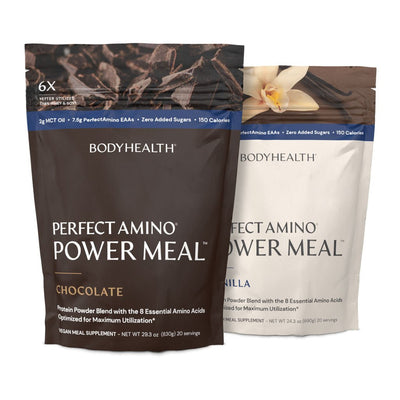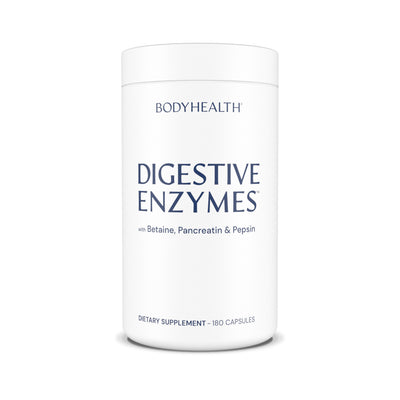How Whey Protein Causes Bloating & Gas
August 12, 2025 4 min read

Did you know whey powder can cause bloating? Or that it can cause poor digestion and even feed harmful bacteria?
It can. And many people using it don’t realize that some of that extra body fat they may be trying to get rid of isn’t body fat at all, but bloating from the whey they’re taking.
Many people use whey protein powders as an easy way to get in more protein to help them build muscle or just to keep their protein levels high.
In fact, it’s become fairly ingrained in the diets of many body builders and fitness trainers.
But does it help as much as most people think?
Yes, it’s easier to get in more “protein.” But this isn’t high quality protein. Less than 20% of the whey we consume is actually used to build muscle or bone, etc. Instead, it’s converted to sugar and body fat — calories.
But aside from the much higher calories, whey protein can also cause bloating and gas that lasts for a few hours to a few days for some.
For many this comes from the high lactose levels in whey, but it’s more than that.
Whey can also cause poor digestion and even feed harmful bacteria in the gut.
And… most whey powders today contain many additives: Artificial sweeteners, artificial colors and flavors, gums and thickeners, and they’re very heavily processed.
So how does this all cause bloating and why do we use whey in the first place?
Let’s find out.
WHY DID PEOPLE START TAKING WHEY PROTEIN
The idea to use whey when working out became popular in the 1970’s and 80’s. And the idea came from marketing, not actual usefulness.
Thus, you won’t find golden age body builders who used whey, just as you won’t find golden age body builders who had to do much cutting.
Whey is a byproduct of the cheese making process. It’s what’s left over, and dairy farmers have a lot of it.
But up until the 70’s, dairy producers sold their extra whey to other farmers who used it as a fertilizer.
Then along came nitrogen fertilizers, which started becoming more popular due to being cheaper, and suddenly these dairy farmers had a lot of extra whey on their hands.
So, as it was a “protein” source, they decided to market it that way. A faster, easier way to hit your protein goals.
But there was missing information here. Just because something is a protein doesn’t mean our body can use it for protein.
As you know, we don’t get protein from protein, we get amino acids. But the human body needs specific amino acids in the correct ratios to each other. Anything outside of this can’t be used and is converted to sugar or body fat.
Well, over 80% of the amino acids in whey can’t be used. And they’re converted to calories.
But it goes beyond this. Because while whey powder is a poor protein source, it also causes bloating, indigestion, feeds harmful bacteria and often contains other harmful ingredients.
HOW WHEY CAUSES BLOATING & POOR DIGESTION
Bloating from whey protein comes from four main things: lactose intolerance, protein digestion issues, artificial additives or sweeteners commonly found in commercial protein powders, and the feeding of harmful bacteria.
First, lactose intolerance is a large contributor to whey protein bloating. Whey protein comes from milk, containing lactose, a sugar found naturally in dairy.
People with lactose intolerance have low levels a specific enzyme called lactase which is what breaks down lactose. Without enough of this enzyme, the lactose in whey doesn’t get fully digested it starts to ferment.
This fermentation then produces gas which leads to bloating.
This usually comes with a feeling of fullness, stomach protrusion, gas, and sometimes discomfort.
It can even cause diarrhea and stomach cramps depending on how lactose intolerant they are.
Now, that’s people who have lactose intolerance, which many os us, but not all, have to a degree.
But even without lactose intolerance the digestion of whey protein itself can cause bloating.
This is because it’s quickly digested. But taken in large amounts, without enough hydration, it can overwhelm the digestive system.
Also, when consumed quickly or in large quantities, whey may not fully break down in the stomach and small intestine.
This incomplete digestion can result in undigested proteins reaching the colon, where gut bacteria ferment them.
Like lactose fermentation, this protein fermentation produces gas, resulting in bloating.
It also means that the undigested whey is never used for protein in the body.
This can also cause us to feel overly full, tight, or uncomfortable in our stomach, and can cause stomach swelling or bloating that can last for many hours.
Then there are the extra ingredients.
Artificial additives or sweeteners are very common in whey powders. Sorbitol, maltitol, sucralose, and acesulfame potassium, which are each known to cause digestive upset.
These additives are also poorly absorbed by the small intestine and also ferment in the colon. This fermentation again leads to increased gas production and bloating.
People sensitive to artificial additives may notice bloating along with gas and even diarrhea.
HOW TO HIT YOUR PROTEIN GOALS WITHOUT THE BLOATING OR CALORIES
We already know that we don’t need protein, we need the amino acids that make up that protein.
That’s the only thing we get from protein.
Our body then uses these amino acids to build new proteins in the forms your body needs.
But we need exact amino acids, the essential amino acids, and we need them in a precise ratio to ensure they’re fully used.
That’s what PerfectAmino is.
It’s predigested essential amino acids — so we don’t have to worry about bloating from poor digestion — in the precise ratio needed to build new protein in the body without that caloric impact of whey and other protein sources.
It also contains no dairy, so there is no risk of bloating from lactose.
And it contains zero artificial sweeteners, flavors or colors.
It’s the most natural and effective amino acid product there is.
If you want the best results, without the calories and without the bloating, try PerfectAmino.
And if you have any trouble with gas or bloating, make sure to check out Gut Restore and the Gut Health Program, they're very effective.
Articles by Health Topic
Your Path To Better Health Starts Here!
From in-depth articles on nutritional benefits to updates on new product launches, stay informed and inspired on your journey to optimal health.
*These statements have not been evaluated by the Food and Drug Administration. These products are not intended to diagnose, treat, cure, or prevent any disease.









